

Outcome-Based Assessment - Student Experience - Western University. Skip to Content Faculty / Staff Search or Department / Unit Search WesternU.ca.
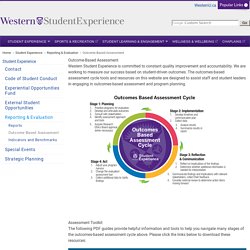
Student Self-Assessment and Reflection - Ky. Skills U. Formative assessment in the classroom and school. Teachers and schools need to check for learning throughout the school year, not just wait for final examinations.
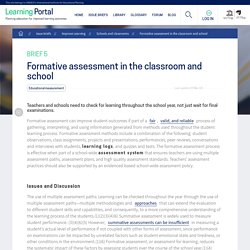
Formative assessment can improve student outcomes if part of a fair, valid, and reliable process of gathering, interpreting, and using information generated from methods used throughout the student learning process. Formative assessment methods include a combination of the following: student observations, class assignments, projects and presentations, performances, peer reviews, conversations and interviews with students, learning logs, and quizzes and tests.
Assessment For Learning In Physical Education. Formative assessment in the classroom and school. The Purpose of Assessment Feedback and How Teachers Can Ace It. Feedback is an essential element in assuring our students’ growth progress.
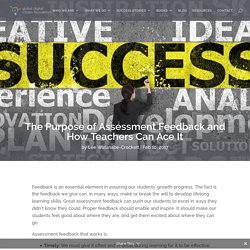
The fact is the feedback we give can, in many ways, make or break the will to develop lifelong learning skills. Great assessment feedback can push our students to excel in ways they didn’t know they could. Proper feedback should enable and inspire. It should make our students feel good about where they are, and get them excited about where they can go. Higher education standards: improving course evaluation. How can we start to place students at the heart of the system?
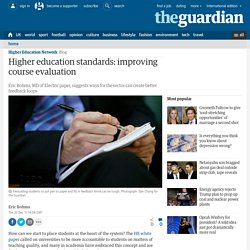
The HE white paper called on universities to be more accountable to students on matters of teaching quality, and many in academia have embraced this concept and are forging two-way communication with their students. However this best practice is by no means uniform across the sector, and others are still struggling with the nuances of closing the 'feedback loop' - ensuring lines of communication between student and university are robust and transparent.
Only in an environment where all parties can provide and learn from the other will students feel empowered as stakeholders in their own education and universities can improve their practices. In order to place students at the heart of the higher education, universities must start to examine and improve the process of course evaluation. The need to improve response rates. Formative assessment and self-regulated learning. By Nathan Woods Formative assessment is not something that happens to learners after they have completed a learning activity.
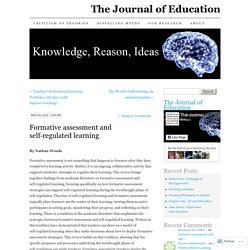
Rather, it is an ongoing, collaborative activity that supports students’ attempts to regulate their learning. 360 Degree Feedback: The Good, the Bad, and the Ugly. Want to make people happy?
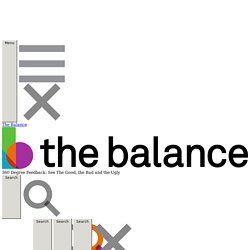
Anxious? Care to create an uproar in your organization? Want to stir up all of the dormant fear hidden just below the surface in your organization? You think we're talking about laying off half your staff—right? Wrong. we're talking about organizations that do a poor job of introducing and implementing 360 degree or multi-rater feedback. Nothing raises hackles as fiercely as a change in performance feedback methods, especially when they affect compensation decisions. What types of e-assessment could I use? - SQA. The Art Of Giving Feedback In eLearning. 7 Tips To Create An Effective Constructive Feedback System For eLearning.
Mastering Deeper Learning, Part 2: Feedback. Feedback and feed forward. What are the issues?
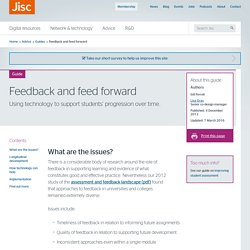
Using inline marking - MOLE (My Online Learning Environment) - CiCS. Introduction to e-Assessment. Assessment - Feedback and Assessment - Toolkit for Learning and Teaching - LeTS. Validity: Assessment and curriculum design | Defining formative and summative assessment | Principles of Assessment | Ensuring reliability of assessment | In Practice | Resources Students often take their cues about what they need to learn more from assessment than from teaching.
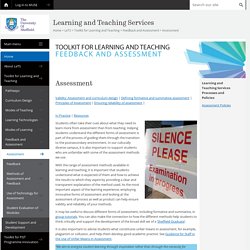
Helping students understand the different forms of assessment is part of the process of guiding them through the transition to the postsecondary environment. Giving Assessment Feedback. Devising strategies for feedback can save you time by reducing: the number of complaints from students who believe they have been unfairly marked the amount of time lecturers spend reading assignments that do not answer the question the amount of confusion between markers as to what the submission is supposed to look like.
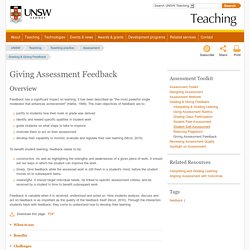
The time involved to set up the strategies will be more than recouped in the course of the semester. Basic Education Curriculum Guide - To Sustain, Deepen and Focus on Learning to Learn (Primary 1-6)- Chapter5. File:Assessment As Learning.png. 7 Strategies To Help Students Ask Great Questions. Bring TeachThought Professional Development To Your School!
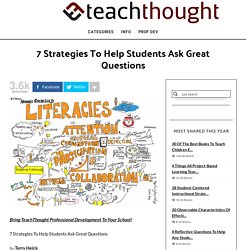
7 Strategies To Help Students Ask Great Questions by Terry Heick Questions can be extraordinary learning tools. A good question can open minds, shift paradigms, and force the uncomfortable but transformational cognitive dissonance that can help create thinkers. In education, we tend to value a student’s ability to answer our questions. The latter is a topic for another day, but the former is why we’re here. 8 Strategies To Help Students Ask Great Questions 1. The TeachThought Learning Taxonomy is a template for critical thinking that frames cognition across six categories. It imagines any learning product, goal, or objective as a “thing,” then suggests different ways to think about said “thing”–mitosis, a math formula, an historical figure, a poem, a poet, a computer coding language, a political concept, a literary device, etc. 1. 2. 3. 4. 5. 6. A literary device–a metaphor example, is usually studied in isolation. The upside? 2. Turnitin.